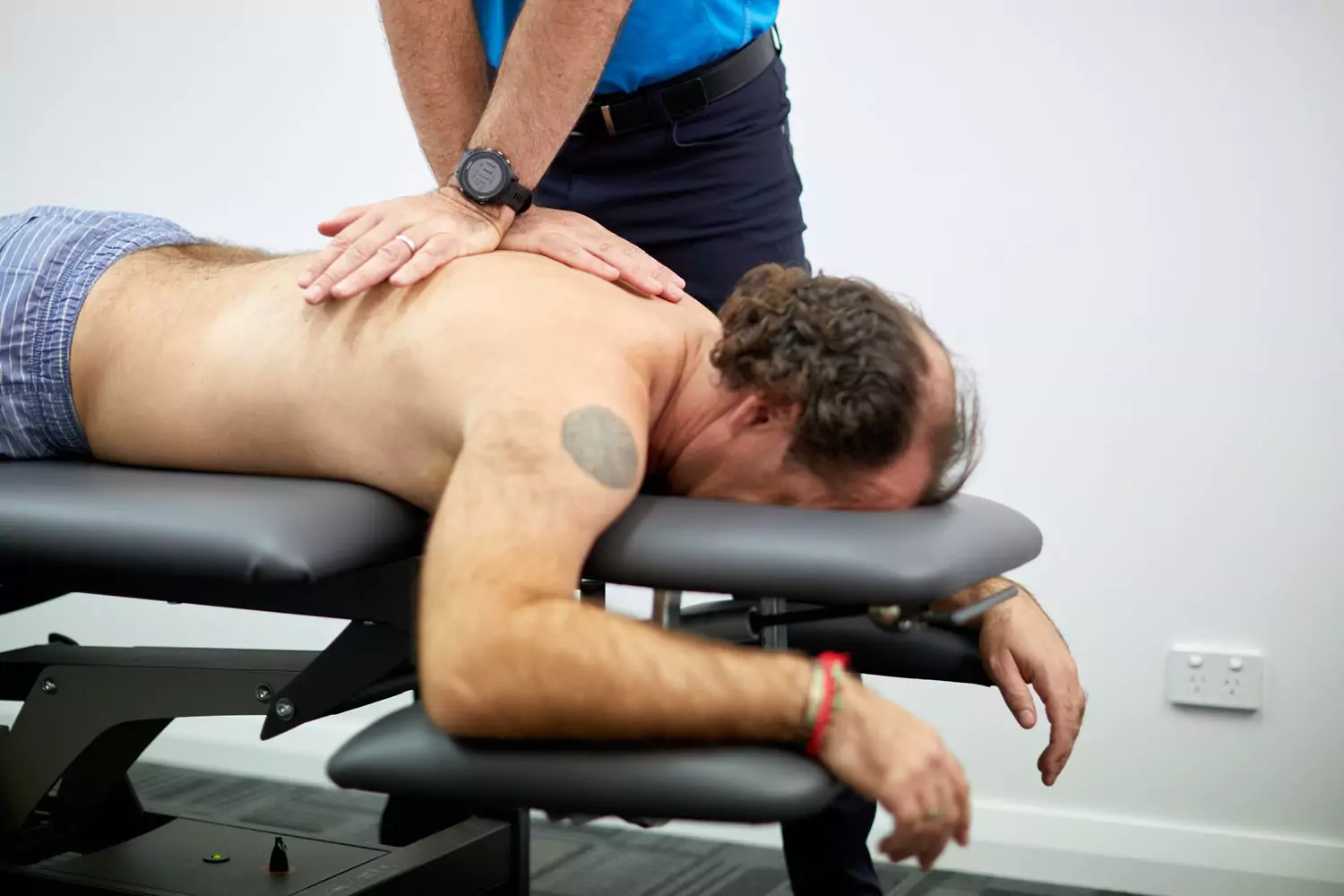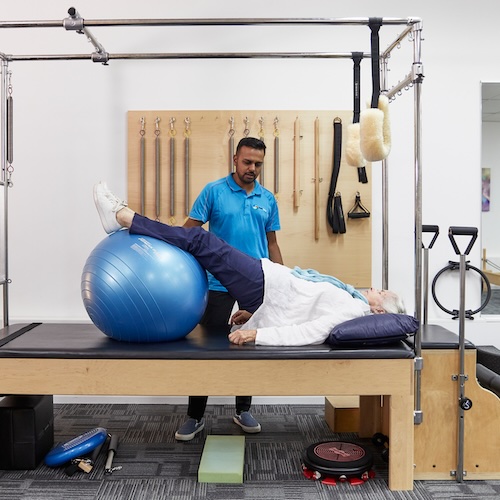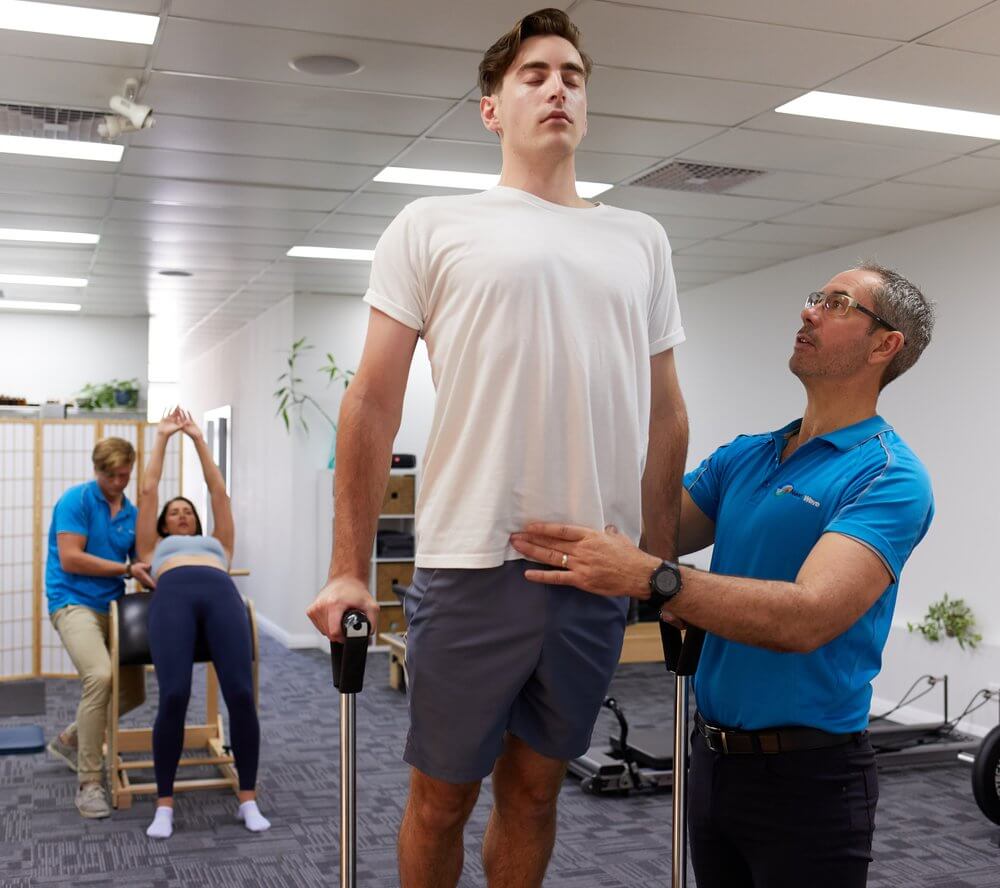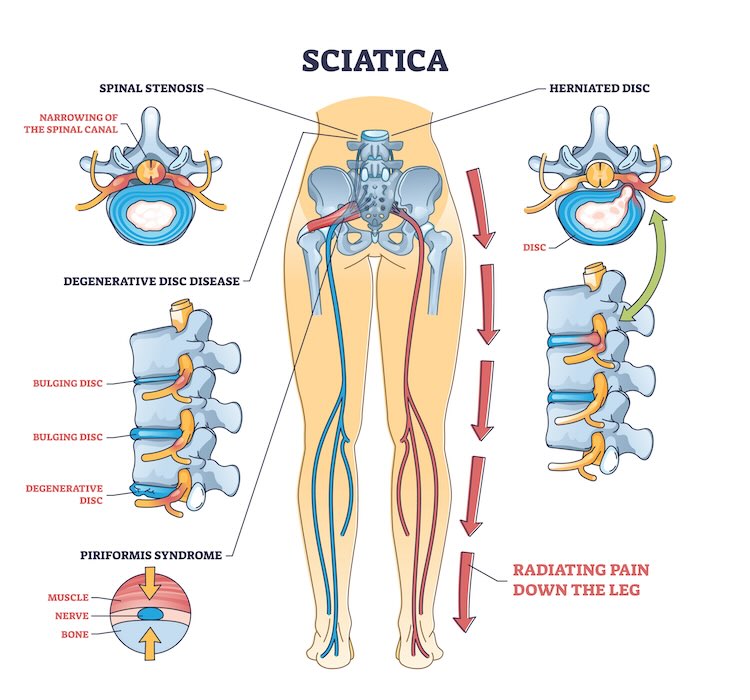3a/352 South Street O’Connor WA 6163 | (08) 93376460
Home » Physio Fremantle » Sciatica Physio
At Next Wave Therapy, our sciatica physio in Perth is led by Dr Jonathan Wray, FACP; one of a small number of Specialist Musculoskeletal Physiotherapists in Australia. Drawing on years of advanced training and experience, our team helps you regain control, reduce pain, and get back to the activities you love. If you’re ready for a proven approach to sciatica relief, you’re in the right place.
At Next Wave Therapy, we’ve been helping people manage nerve-related pain since 2016. Led by Dr Jonathan Wray—one of fewer than 80 Specialist Musculoskeletal Physiotherapists in Australia—our clinic has a strong focus on spinal conditions, nerve compression and complex pain presentations.
Our experienced team takes a holistic, evidence-based approach to sciatica treatment. Depending on your needs, your physiotherapy plan may include manual therapy, dry needling, targeted nerve gliding, strengthening exercises, Clinical Pilates, and postural education.
By addressing the underlying cause of your symptoms, we aim to reduce pain, restore movement and prevent flare-ups—so you can get back to doing what you love.
Monday: 9 am – 7 pm
Tuesday: 8 am – 7 pm
Wednesday: 8 am – 6 pm
Thursday: 7 am – 7 pm
Friday: 8 am – 12 pm
Saturday: 8 am – 12 pm
Sunday: Closed



Dry needling and acupressure techniques help calm irritated nerves and release deep muscle tension that may be contributing to sciatica symptoms. These methods are especially useful for reducing guarding, improving circulation, and supporting tissue healing. Clients often experience noticeable pain relief, enhanced mobility and reduced sensitivity after just a few sessions.


Sciatica symptoms vary depending on which nerve root is affected and how the nerve is being irritated. Some people experience sharp pain, while others feel more like numbness or tingling.
• Pain radiating from the lower back or buttock into the leg
• Tingling, numbness, or burning sensations in the thigh, calf or foot
• Muscle weakness in the affected leg or difficulty lifting the foot
• Symptoms worsened by sitting, bending, or standing too long
• Relief when lying down or walking short distances
In some cases, the pain is constant; in others, it comes and goes. If your symptoms are worsening or affecting your mobility, our physiotherapists can help guide you to recovery.


Sciatica is most often caused by irritation or compression of the sciatic nerve, either at the nerve root in the lower back or along its path through the buttock and leg. This can develop gradually from repetitive strain or suddenly from an injury.
• Lumbar disc herniation or bulging placing pressure on nearby nerves
• Spinal stenosis, often from age-related changes in the spine
• Spondylolisthesis, where a vertebra slips out of alignment
• Piriformis syndrome, when a muscle in the buttock compresses the sciatic nerve
• Postural overload from prolonged sitting or poor movement habits
• Pregnancy, due to increased pressure on the pelvis and lower back
Understanding the root cause is key to selecting the right treatment and avoiding future flare-ups.

Dr. Wray specialises in managing complex musculoskeletal and sports injuries with a focus on swimming and surfing injuries.

Amy specialises in injury rehabilitation and return-to-sport planning, with a focus on CrossFit, running, and cycling.

Rushil has a passion for treating athletes, with a special focus on golf, racquet sports, cricket, and gymnastics.
Sciatica physiotherapy is a focused treatment designed to relieve pain and improve function for those suffering from sciatica, a condition caused by irritation or compression of the sciatic nerve. Our expert therapists at Next Wave Therapy utilise a combination of targeted exercises, manual therapy, and posture correction to alleviate discomfort and promote healing. Through personalised treatment plans, we aim to reduce pain, enhance mobility, and prevent future flare-ups. Our compassionate team is dedicated to helping you manage sciatica effectively, ensuring you can return to your daily activities with confidence and ease.
Absolutely. Physiotherapy is often the first-line treatment for sciatica. Our tailored approach reduces inflammation, supports healing and prevents recurrence.
In most cases, imaging like MRI is not required. If symptoms persist beyond 8 weeks, or there are signs of nerve damage (e.g. numbness, bladder/bowel issues), further investigations may be needed.
Most people improve within 4–8 weeks with the right treatment. Severe cases may take longer, especially if weakness or nerve changes are present.
We focus on long-term outcomes. Your rehab plan includes strategies to minimise flare-ups and build resilience. Clinical Pilates or ongoing strength work may be recommended to support long-term function.
Hands-on therapy, gentle movement and nerve gliding exercises can provide fast relief. We combine this with education on postures and habits that support healing.
No. You can book privately. If you’re using Medicare (CDM), NDIS, DVA or an insurance claim, you’ll need a GP or specialist referral.
Yes, we are registered NDIS providers for both self- and plan-managed clients. Apply for NDIS care.
Your initial consultation includes a thorough evaluation, where we take a detailed history and perform a physical assessment. We then provide a clear diagnosis and commence hands-on treatment. Additionally, you’ll receive a comprehensive management plan with prescribed exercises and advice on the recommended frequency and duration of your treatment.
For psychological therapy, we start with a comprehensive evaluation, including a detailed history and mental health assessment. Following this, we provide a clear diagnosis. You’ll also receive a thorough management plan, including guidance on the recommended frequency and duration of your treatment.
Your second consultation, scheduled shortly after the initial visit, allows for feedback and questions. We perform a streamlined re-evaluation through a physical assessment, helping you to see the benefits of the treatment. Subsequent consultations are designed to support your recovery and achieve optimal outcomes for your pain or injury.
For psychological therapy, the second consultation, also scheduled shortly after the initial visit, offers a chance for feedback and questions. A streamlined re-evaluation is conducted, allowing you to experience the benefits of the treatment. Subsequent consultations focus on supporting your recovery and achieving the best outcomes for your mental health.
Cancellations with less than 24 hours notice or non-attendance are billed at 50% of the consult fee and do not qualify for a rebate.
A doctor’s referral is generally not required unless your condition is associated with Workers Compensation, Motor Vehicle Injury, Veterans Affairs, or a Medicare Mental Health Care plan. In most cases, you can directly schedule an appointment since all our physiotherapists are primary contact practitioners capable of providing comprehensive care without a referral.
To access physiotherapy services through Medicare, you must have a referral from your GP under the Chronic Disease Management Plan, often referred to as an Enhanced Primary Care Plan (EPC). This plan is necessary for Medicare coverage when seeing a physiotherapist.
To access occupational therapy services through Medicare, you must have a referral from your GP under the Chronic Disease Management Plan (EPC) or a Mental Health Care Plan (MHCP). This plan is necessary for Medicare coverage when seeing an occupational therapist. For more information on eligibility and how to claim, refer to our schedule of fees explaining how Medicare can be used for occupational therapy.
As a person seeking healthcare in WA, you have the right to access, safety, respect, partnership, information, privacy, and the ability to provide feedback. For more detailed information on your rights, review the Australian Charter of Healthcare Rights.
We prioritise your privacy. Our strict privacy policy ensures the confidentiality of your personal information, using it solely for your healthcare. If you have any privacy concerns or questions, please reach out, and we’ll address them promptly. Your trust is crucial to us. Review our privacy policy here.